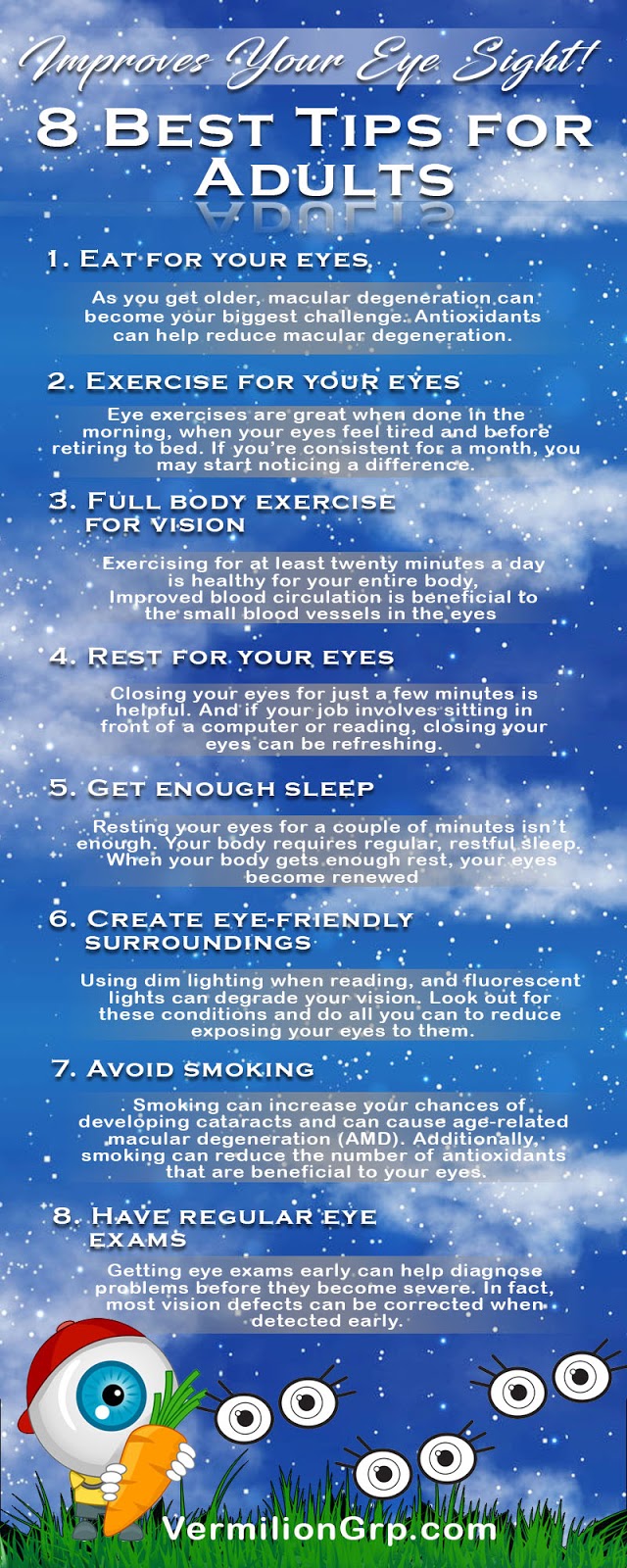1. Eat for your eyes
Eating carrots is
good for your vision. Although it may sound cliché, it’s not entirely wrong.
Carrots are rich in vitamin A, an essential nutrient for vision. However,
vitamin A isn’t the only vitamin that promotes healthy eye function. Make sure
that you include foods rich in vitamin C, vitamin E, copper, and zinc to your
diet.
As you get older,
macular degeneration can become your biggest challenge. Antioxidants can help
reduce macular degeneration. As such, eat foods such as eggs, pumpkins,
carrots, dark leafy greens, and sweet potatoes.
2. Exercise for your eyes
Since eyes have
muscles, they could use some exercises to remain in good shape. Eye exercises
are great when done in the morning, when your eyes feel tired and before
retiring to bed. If you’re consistent for a month, you may start noticing a
difference.
Begin by warming
your eyes for five seconds with warm palms. Do it three times. Rolling your
eyes isn’t just an expression of annoyance, it can help your eye muscles too.
Look up and circle your eyes about ten times in both directions.
3. Full body exercise for vision
Exercising for at least
twenty minutes a day is healthy for your entire body, including your eyes.
Improved blood circulation is beneficial to the small blood vessels in the eyes
as it removes harmful substances that may have been deposited. Exercise doesn’t
have to be intense. In fact, a brisk walk is enough.
4. Rest for your eyes
Closing your eyes
for just a few minutes is helpful. You can do this once an hour or many times
when you’re hard at work. And if your job involves sitting in front of a
computer or reading, closing your eyes can be refreshing. As simple as it
sounds, this exercise can protect your eyes from over exertion or fatigue.
5. Get enough sleep
Resting your eyes
for a couple of minutes isn’t enough. Your body requires regular, restful
sleep. Any doctor will inform you about the importance of sleep for your health
and wellbeing. When your body gets enough rest, your eyes become renewed. If
you engage in intense visual activity such as working on a computer or reading
a book, short breaks go a long way in helping your eyes, as it gives them a
chance to rest.
6. Create eye-friendly surroundings
Plenty of things
that surround us everyday can be bad for the eyes. For instance, sitting for
long periods of time in front of a computer, getting swimming pool chlorine
water in your eyes, using dim lighting when reading, and fluorescent lights can
degrade your vision. Look out for these conditions and do all you can to reduce
exposing your eyes to them.
7. Avoid smoking
Apart from being
unhealthy for many reasons, smoking can contribute to blindness. Smoking can
increase your chances of developing cataracts and can cause age-related macular
degeneration (AMD). Additionally, smoking can reduce the number of antioxidants
that are beneficial to your eyes.
8. Have regular eye exams
Most
people wait until they experience vision problems to get eye exams. Sometimes,
that can be too late. Getting eye exams early can help diagnose problems before
they become severe. In fact, most vision defects can be corrected when detected
early.
Do you know that Ginseng has been used for millennia for the maintenance of general health and well being? It has often been called the “elixir for longevity”!
Different types of ginseng exists, with the 6 year-old Korean Red Ginseng being the most sought after. In the past, this type of ginseng were only reserved for the Emperor and royalties.
Boasting a dose of 900mg of 6 year-old red ginseng extract per serve to combat mental stress and physical fatigue.
Check out the Vermilion Health & Vitality Jelly that will bulletproof both your body and mind be it at the workplace, gym or in the classroom.



No comments:
Post a Comment